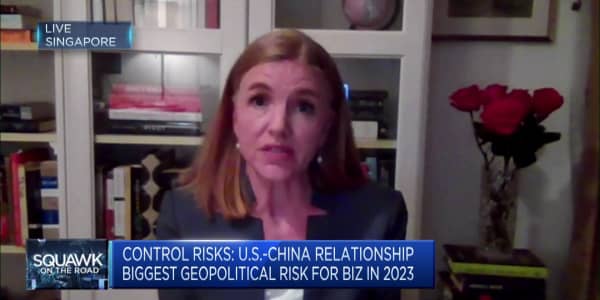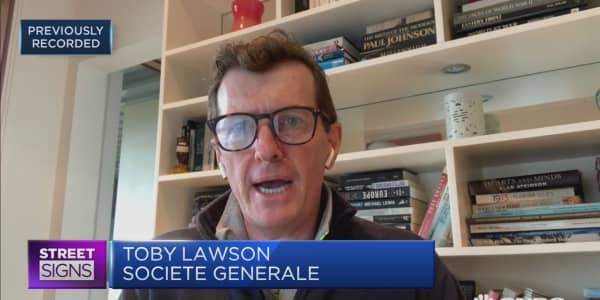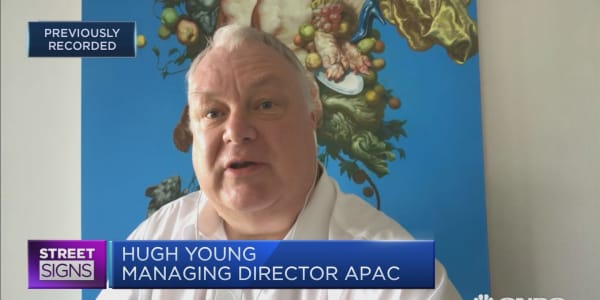
It's election year for major emerging market economies from India to Brazil.
And political risk falls at a time when investors are assessing just what an unwinding of U.S. monetary stimulus means for the developing world.
The so-called 'Fragile Five' – India, Indonesia, Brazil, South Africa and Turkey – all hold elections in the months ahead, with corruption just one theme expected to be feature highly.
(Read more: Fragile Five face low risk of full-fledged crisis: Roubini)
"There has been a notable shift in market concerns about emerging markets over the past month or so," said Nicholas Spiro, managing director at Spiro Sovereign Strategy. "While the May to August 2013 phase of the sell-off was dominated by fears about balance of payments weaknesses, the current phase is about a broader set of risks, in particular growth, the credibility of the policy-making regime and the political climate in general."
Here's a run-down of what to expect in five key emerging markets.
Indonesia
Election due: Elections for a new parliament expected in April, followed in July by a presidential election. If there is no clear winner in the first round of voting in the presidential election, a second round is expected to take place in September.
Backdrop: Like its emerging market peers, Indonesia has come under pressure from an unwinding of U.S. monetary stimulus that has exposed economic weaknesses such as a wide current-account deficit. The central bank has hiked rates five times since the middle of last year to prop up a crumbling currency. While the economy, the biggest in Southeast Asia, grew a better-than-expected 5.72 percent on year in the fourth quarter, economists say political uncertainty, the impact of monetary tightening and a controversial mineral export ban will all be headwinds in the coming months.
Key election themes: Endemic corruption, poor infrastructure, under investment in health and education.
Expected outcome: Analysts say it's unlikely that any one party will win an outright parliamentary majority. The best case scenario for markets, they say, is one in which a big party wins a sizeable chunk of seats that enables it to form a coalition with one or two other parties. The country's main political parties include President Susilo Bambang Yudhoyono's Partai Demokrat and the opposition Democratic Party-Struggle run by former President Megawati Sukarnoputri.
Candidates for the presidential election are not expected to be announced until after the parliamentary vote. One potential candidate is popular Jakarta governor Joko Widodo, known as Jokowi. He is viewed as a favorite to win if selected to run.
The wild card: Watch the youth vote. Of the projected 187 million eligible voters in this year's elections, over a third will be between the age of 16 and 20. Indonesia's politicians face a young electorate that is increasingly online and this could well shape the political landscape in the years ahead, analysts say.
View from the experts: "From the market perspective, a Joko government might be the best case scenario – primarily for the chance of breaking the parliamentary deadlock, which has held back tough economic reforms," says Wellian Wiranto, an economist at OCBC Bank.
India
Election due: National elections due by May; no date set yet.
Backdrop: India, Asia's third biggest economy and the world's largest democracy, was one of the hardest hit emerging markets last year. Its currency slumped to a record low last August, as investors punished the country for not doing more to tackle a wide current-account deficit, address a sluggish economy and implement structural reforms. The start of 2014 has been far more positive, with a concerted bid by India's central bank to contain the crisis. The government in its budget this month meanwhile unveiled indirect tax cuts to help woo voters.
Key election themes: Consumer inflation, running at an annual rate above 9 percent, and rampant corruption.

Expected outcome: Opinion polls suggest the ruling Congress party is heading for defeat at the hands of the opposition Bharatiya Janata Party's (BJP).
The wild card: The anti-corruption Aam Aadami Party has shaken things up, winning the hearts and minds of an electorate dismayed with corruption. The party made a spectacular debut in Delhi state elections at the end of last year, winning 28 of the 70 seats up for grabs. Whether it can replicate that success across the country now remains to be seen.
(Read more: India's hottest startup is a political party)
View from the experts: "The main thing now is that we get a stable and effective government," said Standard Chartered Senior Economist Anubhuti Sahay. "Since 2010, policy making has not happened at the required pace, so the election could be a turning point for the economy and that would mean the investment environment improves."
South Africa
Election due: General election scheduled for May 7.
Backdrop: South Africa's economy grew 0.7 percent on quarter in the third quarter of 2013, the slowest pace in more than four years, and sticky inflation stood at an annual 5.4 percent on year in December. Its currency, the rand, hit a five-year low against the dollar in January, exacerbating labor disputes and a wide current-account deficit.
Key election themes: Unemployment running at about 24 percent, poor infrastructure, labor unrest, a weak economy and corruption.
Expected outcome: The African National Congress (ANC) is expected to extend its 20-year hold on power but with a reduced minority in the 400-seat parliament amid corruption scandals and civil unrest. The ANC has won each of the last four elections by a landslide, winning more than 60 percent of the popular vote. The Democratic Alliance is the official opposition and currently holds 67 seats to the ANC's 264.

The wild card: According to the Council on Foreign Relations (CFR), a think tank, the Economic Freedom Fighters (EEF), founded by former head of the ANC's youth wing Julius Malema is something to watch. The EEF favors wholesale nationalization of land and industry and appeals directly to the poor in townships and rural areas. Some analysts say the EEF could win as much as 10 percent of the vote – a development that would be an "earthquake," the CFR said.
View from the experts: "Conventional wisdom is that this will be the most competitive election in the country's post-apartheid history," analysts at CFR wrote last month. "Should the ANC's share of parliamentary seats fall below 60 percent, there likely will be a strong move to replace [President Jacob] Zuma as party leader–and as chief of state. However, it is difficult to imagine that the ANC will 'lose' its majority in parliament."
Turkey
Election due: Local elections scheduled for March; presidential elections set for August. Parliamentary elections due in 2015.
Backdrop: Prime Minister Tayyip Erdogan's AK Party, which has been in power since 2003, faces a tough time heading into these elections. A high-level bribery and corruption scandal involving government allies sparked street protests late last year. The Turkish lira meanwhile slumped to a record low against the dollar in January, forcing the country's central bank to hike interest rates, which in turn threatens to hurt the economy.
(Read more: Turkey: What's going on and why you should care)
Key election themes: Corruption, inflation.
Expected outcome: Erdogan has dominated Turkish politics for more than a decade and won credibility for delivering economic stability. A survey by SONAR research, one of Turkey's main pollsters, last month put support for the AK Party at 42.3 percent, two percentage points below its last poll in August 2013 and below the 50 percent won by the AK in the 2011 election, Reuters reported. While a corruption scandal has hurt the party's popularity, it remains comfortably above the opposition in opinion polls.
The wild card: The outcome of local elections in March is something to watch closely and could be a key factor in determining whether Erdogan runs as a presidential candidate.
View from the experts: "Next month's local elections will provide the first real test of the popularity of Erdogan's AKP which has been losing support since the Gezi park protests last May," said Nicholas Spiro, managing director at Spiro Sovereign Strategy.
"If the AKP were to lose Istanbul and [the capital] Ankara, recriminations would ensue and Erdogan may even decide not to run for the presidency in elections later this year. However, the AKP is still very popular in rural Anatolia and the political opposition in Turkey remains weak and lacks credibility," he said.
Brazil
Election due: Elections for a new president and parliament are expected on October 5.
Backdrop: Brazil, the biggest economy in Latin America, faces an uncertain election year. Its stock market, down more than seven percent so far this year, has been battered by Federal Reserve tapering fears. A severe drought is stretching the country's finances, the central bank has hiked interest rates by 325 basis points since April last year to contain inflation and last year a small demonstration against a 50-cent rise in bus fares exploded into the biggest street protest Brazil has witnessed in years.
Key election themes: Poor public services, rising living costs and deteriorating public finances and corruption.
Brazil's stock market: One-year chart
Expected outcome: President Dilma Rousseff from the Workers' Party is running for re-election and despite the weak economic backdrop she is the favorite to win. The outcome however, could still be a close call, analysts say. Other candidates include Marina Silva, an environmentalist and former environment minister.
(Read more: Brazil needs investors to reclaim BRIC growth)
The wild card: The World Cup. What exactly does soccer have to do with an election? Well, potentially a great deal if shutdowns associated with preparing or hosting the sporting event takes a toll on the economy, analysts say. A law passed last year gives the 12 cities hosting matches and the states in which they are located the right to declare special holidays on game days, Reuters reported. While it's not yet clear whether these holidays will go ahead, the impact is certainly something to watch.
View from the experts: "The poorer have tended to be loyal supporters of [former President Luiz Inacio Lula da Silva] Lula/Dilma, since the government's social programs benefited them," said Guy Burton, assistant professor, School of Politics, History and International Relations, University of Nottingham, Malaysia. " It's also the case that the support of the Workers Party has shifted over the last decade, from its core base in the industrial urban heartland and trade union movement of the south, including Sao Paulo to the poorer, rural, less educated and marginal Northeast."
— Writing by CNBC's Dhara Ranasinghe. Follow her on Twitter at @DharaCNBC





